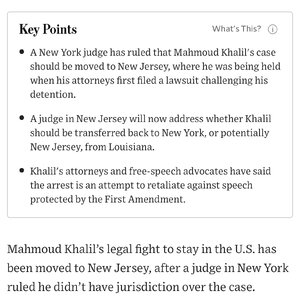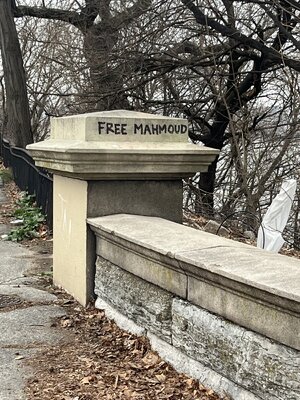Rust v. Sullivan says Congress can choose to fund doctors who speak with their patients about family planning only, while denying funding to doctors who speak about abortion. Obviously, the government could not directly restrict what the doctors say to their patients (assuming it is medically viable advice), but it could be done indirectly through bribery. Of course, the pulling of funding from Columbia University is a lot different than the Title X issue in Rust, but I also don't trust this Court to view the issue the way you do.
I had admittedly forgotten about that case, in part because the Court has been running away from it, but you're right it's relevant. I'm not sure it does much for the administration, though.
The main difference is that the program in Rust was all of one piece. To make a spatial analogy, in that case everything occurred in the doctor's office. The money went to the doctor's office to pay for family planning. The regulation prohibited the doctor from referring to an abortion provider, which is consistent with the program's goals (according to the majority, applying Chevron lol). The court went out of its way to assert that the doctors were not prevented from speaking about abortion outside of the Title X context -- i.e. they could tell anyone about an abortion provider, except during the course of an appointment funded by the federal planning money. Arguably, the regulation was closing a loophole. The idea was that the effectiveness of the program depended on its ability to restrict certain behavior. The court used the analogy that funding a center for promoting democracy doesn't require the government also to fund a center for promoting fascism -- which surely is true (regardless of how well it applied to those facts). Ultimately, the referral restrictions were a part of the terms of service, so to speak.
This case is completely different. When the government says, "you don't get any health research money unless you stop DEI," that's a) punitive; b) targeted; c) not in any way loophole-closing and d) not part of an integrated government program. The government could say, I suppose, "you don't get money for DEI research." But it can't say that "you don't get any money unless you do these unrelated programs." It would be like conditioning funding on endorsing the president.
I see this more like the Obamacare case. There the court said, essentially, "you can't coerce states into compliance by weaponizing the funding." The Obamacare law, after all, said that funding for operating an exchange was dependent on participating in the Obamacare Medicaid expansion, and I believe that part of the law was upheld. What was struck down (7-2) was the provision that said, "you don't get any Medicaid money unless you opt into the expansion," and that was deemed punitive and beyond the government's power. And it all concerned a single program, Medicaid. I know that's a state/federal case and not a free speech case specifically, but I don't think the underlying principles are different.
The proposition that the government cannot achieve through bribery what it cannot achieve through force is well-established and has a long pedigree. It doesn't mean that every program requirement must be viewed through the lens of the First Amendment. What Trump is doing can *only* be viewed through the lens of the First Amendment. There is no connection between NIH funding and the department of middle eastern studies.
Maybe the Supreme Court would fuck this up, but they would have to disregard a lot of law that they like to do so. The "government can't suppress speech through funding" has been a huge theme of this Court's First Amendment jurisprudence. It's not a question of them overturning cases they don't like. They would have to carve out a huge exception, with no real justification, and that could rebound on them.
As a practical matter, Trump's actions here are an attack on higher education. It's dripping with contempt for colleges. I have real trouble believing that will find much sympathy on the court. Barrett taught law for 15 years and isn't going to see universities as enemies. Kavanaugh teaches classes at Harvard and Yale, or did. And all of them graduated from law school (obviously); they did well at law school; they valued their education; and they aren't keen to see educational institutions get destroyed. Except for Thomas and Alito. That's my view.




